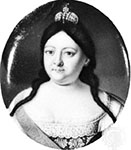Anna
|
 |
born Jan. 28 [Feb. 7, New Style], 1693, Moscow, Russia
died Oct. 17 [Oct. 28], 1740, St. Petersburg
in full Anna Ivanovna
Empress of Russia from 1730 to 1740.
Daughter of Ivan V (reigned 1682–96) and niece of Peter I. the Great (1672-1725) (reigned 1682–1725), Anna was married to Frederick William, ruler of the Baltic seacoast duchy of Courland, on Oct. 31 (Nov. 11), 1710. Although her husband died on the journey to Courland after their wedding in St. Petersburg, Anna remained at Mitau (now Jelgava, Latvia), the capital of Courland, until 1730, when Peter II died and the Supreme Privy Council, the actual ruling body in Russia (1726–30), offered her the Russian throne.
Having accepted the council's proposal as well as its stipulation that she agree to certain “conditions? placing the real power of the state in the council's hands and effectively creating a limited monarchy in Russia, Anna proceeded to Moscow (February 1730, Old Style). But when she arrived and found widespread opposition to the council's conditions among the gentry and officers of the guard, she tore up the conditions (February 25), abolished the Supreme Privy Council, and reestablished the autocracy.
Anna, however, had little interest in government affairs and relied heavily on her lover, Ernst Johann Biron, and a small group of German advisers, including the head of Russia's foreign affairs, Andrey Osterman, and the chief of the army, Burkhard Münnich, to manage the state. While the empress concerned herself primarily with extravagant entertainments and crude amusements in the court at St. Petersburg, her favourites engaged Russia in the War of the Polish Succession (1733–35), which placed a pro-Russian king on the Polish throne, and in the Russo-Turkish War of 1736–39. The outcome of the Russo-Turkish War scarcely justified its tremendous cost in life and money, since the territory Russia gained by the war still left it lacking a warm-water outlet to the sea. In addition, Anna's ruling clique, which employed excessively brutal and repressive practices against its opponents, alienated the gentry, which resented domination by German officials. The increased expenditures of the court, combined with war expenses, led to a relentless extortion of taxes from the peasantry, whose social status steadily deteriorated in contrast with the advantages gained by the upper classes.
Shortly before her death Anna named as her successor Ivan VI. (1740-1764), the son of her niece Anna Leopoldovna (1718-1746), and Biron as the infant's regent.
Copyright © 1994-2002 Encyclopædia Britannica, Inc.
![]()
Sources
- Encylopedia Britannica 2002, Expanded Edition DVD
Web





